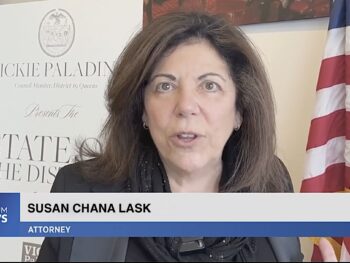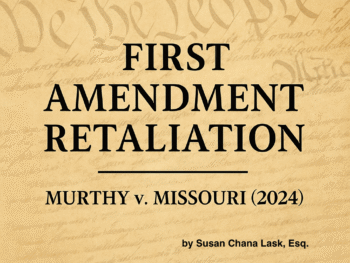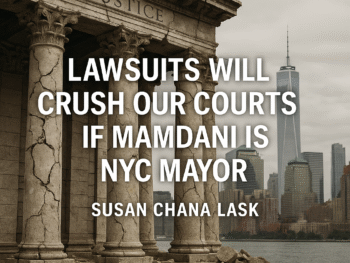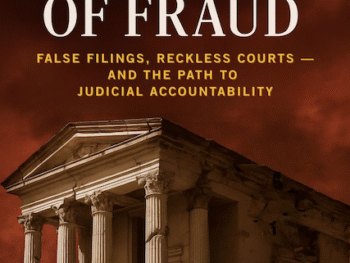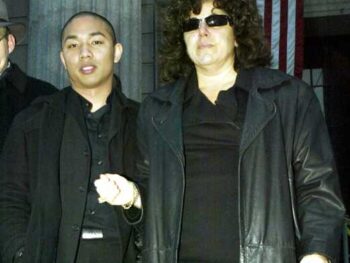Strip Searches of Those Arrested for Minor Offenses Held Unconstitutional
By Mary Pat Gallagher
New Jersey Law Journal
February 11, 2009
A federal judge has held that Burlington and Essex counties violated the Fourth Amendment by blanket strip searches of defendants charged with non-indictable offenses, such as traffic and child-support violations.
U.S. District Judge Joseph Rodriguez said in his Feb. 4 decision that while there is no Third U.S. Circuit Court of Appeals case on point, his holding mirrors rulings by eight circuit courts of appeal.
He also followed a 1987 District of New Jersey decision, Davis v. City of Camden , 657 F. Supp. 396, which held there must exist reasonable suspicion that an arrestee is concealing weapons or contraband for a strip search to be constitutionally justified. He rejected the counties’argument that the 20-year-old precedent did not hold up against the weight of what they termed a modern trend to allow such searches.
The case at hand, Florence v. Board of Chosen Freeholders of the County of Burlington , 05-Civ. 3619, is a class-action suit on behalf ofpossibly thousands of people subjected to the searches since March 2003.
Albert Florence was pulled over by a state trooper on I-95 in Burlington County on March 3, 2005, and arrested on an Essex County bench warrant that related to a fine he had already paid. Florence was taken to the Burlington County Jail, where he alleges he was told to remove all his clothing and while naked, open his mouth, lift his tongue, hold his arms out, turn fully around and lift his genitals in front of an officer an arm’s length away.
After six days in Burlington, he was taken to Essex, where he claims he underwent a similar routine; he and three other inmates were told to enter shower stalls, disrobe and shower, while two officers watched. After showering, Florence was allegedly directed to open his mouth and lift his genitals, and then to turn around, squat and cough before facing frontward again.
The charges against him were dismissed and he was released the next day.
He sued both counties in July 2005 for violation of his individual civil rights, and in June 2006, U.S. Magistrate Judge Joel Rosen granted his motion to file an amended class-action complaint.
Rodriguez certified the class in March 2008.
Both sides moved for summary judgment on the constitutionality of strip searching people arrested for non-indictable offenses.
Burlington County’s policy is to strip search those arrested for indictable offenses but not for lesser infractions without reasonable
suspicion that a weapon, controlled dangerous substance or contraband will be found. For those lesser offenses, the county claims it only
conducts “visual observations,” a less intrusive routine that also involves checking arrestees for scars, marks and tattoos while they stripfor a mandatory shower but not bending of the buttocks or lifting of the genitalia.
In Essex, a directive in effect when Florence was brought in said all arrestees were to be strip searched, with officers to examine the mouth,ears, nose, hair scalp, fingers, hands, arms, armpits, inner thighs and all body openings. It was replaced in April 2005 by one that prohibitssearching non-indictable arrestees absent reasonable suspicion.
Both counties’ procedures failed to pass constitutional muster, found Rodriguez.
“Whether it is called a ‘strip search’ or a ‘visual observation’ — the distinction going only to the intrusiveness of the search — it is still a search for purposes of Fourth Amendment analysis,” he wrote.
Rodriguez was also unpersuaded that the strip searches were justified by security concerns, such as identifying gang members by their tattoos or piercings — so rival gang members are not housed together — or ascertaining who might be carriers of dangerous infections suchas M.R.S.A., methicillin-resistant staphylococcus, which is characterized by boils and other marks.
He denied a preliminary injunction, however, because although there was a strong probability of success on the merits, the plaintiff had
not shown irreparable harm.
In addition, Rodriguez held the defendants had not established they were entitled to Eleventh Amendment immunity or qualified immunity.
Florence’s lawyer, Susan Chana Lask of New York, says the case is the first strip-search litigation in New Jersey in which a class has been certified other than for purposes of settlement and also the first where a judge has ruled on the issue of constitutionality. She says a “conservative estimate” of the class size is 5,000 plaintiffs per county and that the number grows each day.
“You are only supposed to strip search if you have reason to suspect someone is harboring drugs or weapons,” she says. “They tried to argue security but they had no affidavits, no proof of anything that there was a security problem with someone driving down the road being stopped for a ticket and being brought in.”
J. Brooks DiDonato, of Parker McCay in Marlton, who represents Burlington, says the county will appeal and seek a stay of the decision until the appeal is decided. He declines further comment.
Assistant Essex County Counsel Alan Ruddy did not return a call.
A similar class action suit, Hicks v. County of Camden , 05-Civ.-1857, settled for $7.5 million. Camden also agreed it would not strip searchnon-indictable detainees without reasonable suspicion and would train jail personnel in the correct policy. Rodriguez gave final approval to the deal on June 9, 2008.
A federal judge has held that Burlington and Essex counties violated the Fourth Amendment by blanket strip searches of defendants charged with non-indictable offenses, such as traffic and child-support violations.

